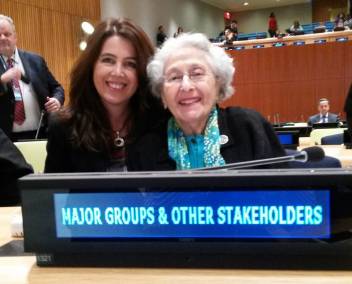 I was recently one of 16 candidates selected from over 100 applicants from around the world to take part in the February Steering Committee of the second intergovernmental negotiations on the Post-2015 agenda.
I was recently one of 16 candidates selected from over 100 applicants from around the world to take part in the February Steering Committee of the second intergovernmental negotiations on the Post-2015 agenda.
My colleague Roseline, from HelpAge in Kenya, took part in the first session in January. The advice she gave me was fundamental to continuing her good work.
The first task assigned to the February Steering Committee was to select a group of speakers from the UN Major Groups and other Stakeholders to input into the discussion on the declaration on the post-2015 development agenda.
The selection process for choosing the speakers was intense as we wanted a geographical and gender balance. We chose 23 speakers; among them was Helen Hamlin, 92, who was selected to speak on behalf of the ageing coalition.
The post-2015 declaration
The co-facilitators for the negotiations, Macharia Kamau from Kenya and David Donoghue from Ireland prepared a paper to encourage discussion on what the content of the post-2015 declaration would be.
The report, called Elements, contains six sections:
- a collective vision of the road to 2030
- what we must do to get there and an explanation of the development post-2015 agenda
- how will we do it and how we will strengthen the UN system
- monitoring and evalutation
- our commitment to the Charter of the United Nations and common values
- a call to action.
In Nueva York
The first thing we did was to meet and draft a preliminary summary with the feedback received from 60 organisations on the different elements of the declaration.
We managed to ensure that all the main points relating to older people were included. These were: the inclusion of the phrase “for all people of all ages”, the mention of older people as a vulnerable group, the reference to the Madrid International Plan of Action on Ageing and the request for data to be disaggregated by age.
The negotiations
The next day we passed controls, corridors and endless elevators to the main building of the United Nations.
We ran to the third floor where the UN Summit was taking place and the Member States were discussing the co-facilitators’ papers.
Despite sitting at the front, it took us some time to understand the fast pace of the negotiation process. We just had few minutes to speak with government representatives, attend the side events of other civil society groups and participate in the Committee meetings themselves, while also following up at intergovernmental meetings.
We would have needed antennas on our heads, wheels on our shoes and cell phones attached to our ears to not miss anything.
Interactive dialogue
The interactive dialogue with major civil society groups and other stakeholders was also held. It was a great success and received positive feedback from the Member States, the UN system and other civil society stakeholders.
During the interactive dialogue, civil society representatives highlighted various key issues such as the need to “leave no one behind”, the eradication of poverty, gender equality and the protection of the planet.
Helen Hamlin, who is 92, spoke on behalf of the coalition of ageing:
“The declaration must offer the commitment to achieve a world of prosperity shared, free of fear, in which no person – throughout their life cycle – lives in poverty, but with dignity, peace and security in a society that is respectful to the planet.”
“The diversity of views expressed was healthy,” concluded the co-facilitator Macharia Kamau, highlighting that the interactive format allowed many actors to discuss a good range of issues.
What next?
Although this period of negotiation did not draw up the finale declaration; many of the features, such as the format and the content are now clearly defined.
After this intense negotiating period, it was agreed that the declaration should be visionary, ambitious, brief and easy to communicate. The declaration should also respond to why we need a new sustainable development agenda and the challenges we must be overcome.
We have now selected the Steering Committee for March. I’m leaving the post in good hands, as Sylvia Beales, our Head of Strategic Alliances and a keen activist, will ensure that no one is left behind in this process!
Find out more about our work to ensure older people are included in the post-2015 process.
